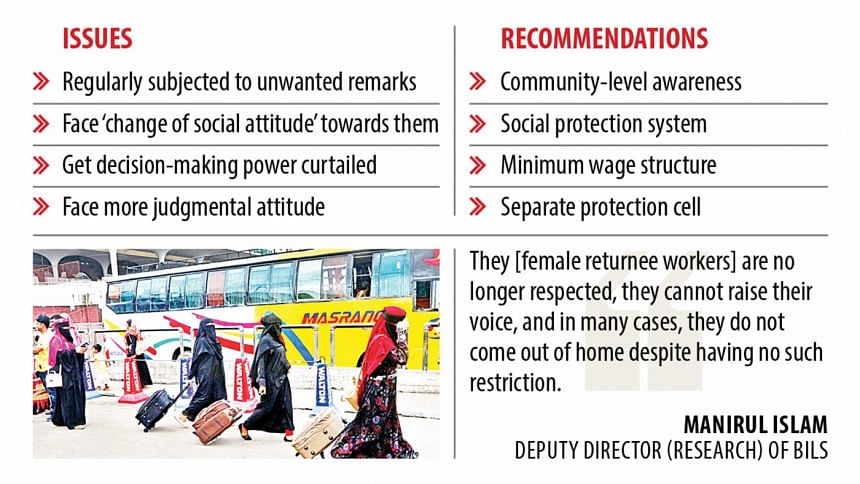Female returnee workers: Abused there, stigmatised here

Afroza Begum (not her real name) worked for three-and-a-half-years as a domestic help in Saudi Arabia.
In the gulf country, she endured long working hours and was not paid her due wage regularly. Yet, the 25-year-old from Faridpur continued her stay, all to support her ailing husband back home.
That is, until her return to Bangladesh in September last year.
It wasn't just financial woes -- nothing she experienced upon her return was pleasant. In her community, she kept facing derogatory remarks from a section of people.
"A lot of people hurled dirty words at me," she said. "They weaved stories around me and made light of the female migrant workers' never-ending struggle with sexual exploitation."
Afroza's case is far from the only one. According to a recent report by Bangladesh Institute of Labour Studies (BILS), returnee female migrant workers are regularly subjected to social stigma in the form of unwanted remarks from their communities.
The report, titled "Social and Economic Reintegration of the Returnee Female Migrant Workers: Success and Sorrows", stated 52 percent of the 323 returnees interviewed felt there was "a change of social attitude" towards them after the return.
The report found that the workers were treated as "low-class people", got their decision-making power curtailed, and faced more judgmental attitude from the community.
Besides, they were often subjected to derogatory remarks and became a common topic of gossip, says the report, published on September 27.
However, the report found that none of them made any formal complaints to any authority in this regard.
Another returnee, who worked in
Oman as a domestic help for about five years, said after returning home in 2016, she had to face unwanted remarks from society regarding her stay abroad. She said some "bad people" would indicate that female migrant workers get involved in "unethical activities" abroad.
But this was far from her reality. "My employer was a woman. She was kind to me, used to take good care of me, and cleared my wages regularly," she added.
The research was conducted across four upazilas each of Jashore, Faridpur, and Chattogram districts between July-December last year. Most respondents were returnees from Saudi Arabia, Lebanon, the United Arab Emirates, Oman, and Jordan.
Manirul Islam, lead researcher of the report, said female migrant workers are usually considered "empowered" in low-income communities, granting them higher decision-making powers than most women. However, upon returning, they lose most of this power.
"They are no longer respected, they cannot raise their voice, and in many cases, they do not come out of home despite having no such restriction," said Manirul, also deputy director (research) of BILS.
Another female returnee (37), from Jashore's Jhikargachha upazila, recounted her psychological abuse in the hands of fellow villagers, made worse by the fact that she was a divorcee.
She found this especially unfair to her. "I had to struggle a lot to raise my daughter alone, with little support from people," she said.
With her income she built a small house in her village and sent her only daughter, aged about 21, to a local college.
After her return, she now earns a living by working as a labourer at local factories in Jashore, occasionally stitching clothes as well, which makes it all the more difficult to stomach the wanton vitriol from the villagers.
The report said 55 percent of the respondents had to return home either unexpectedly or forcefully.
It also said 38 percent respondents alleged they were abused physically in the destination countries, while 52 percent were victims of forced labour, and 61 percent often suffered from lack of food and water while abroad.
Mostly aged between 18-49 years, about a fourth of the returnees are either divorced, widowed, or abandoned by their husbands. More than half of the returnees have no institutional education.
BILS official Manirul said to overcome social stigma towards female returnees, community-level awareness is required.
He said in their research they found that about 90 percent of female returnees think a social protection system should be created for them.
Such a system can include a minimum wage structure for the returnees and a separate protection cell for them, he added.

 For all latest news, follow The Daily Star's Google News channel.
For all latest news, follow The Daily Star's Google News channel. 



Comments